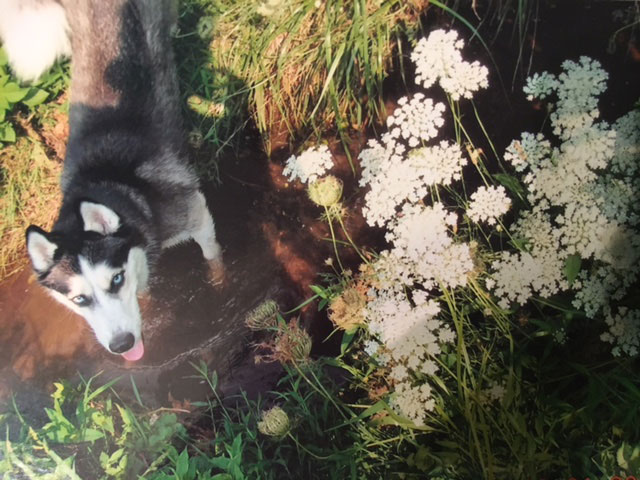I’m not the kind of person who skips to the last page of a novel just to know how it ends (though my life may reflect differently).
At minimum I will race through each word to get to the end of a good story, sometimes focusing too much on typos to absorb the essence of its wisdoms.
There are two guarantees in all stories—there is a beginning and there is an ending. There are two guarantees in the story of life—there is birth and there is a transition to spirit we call death and, in the middle, most of us tend to distance ourselves from the ones we love the most.
The middle somehow becomes masked as slightly less important than the sweetness of birth and the bitterness of death.
Ryver is going to die. In two months it’ll be 14 years since I first held her in my arms, but she won’t make it to see that day.
She never left my side, though huskies are notorious for running (away). She never wanted to run. She only ever wanted to stay. I took her everywhere, literally. The memories I have with her at that time of my life are filled with both love and uncertainty. She was my only real friend and confidant.
When my son was born was the first time I’d been away from her for a couple days at a time. She was so excited to see me when I came back from the hospital, she jumped right up on my newborn baby and that moment was the first time I remember distancing myself from her. I was 19 at the time.
Four years later, when I told my parents I was moving out, the first thing my father asked was, “you aren’t taking the dog are you?” It was an easy out because as a nursing mother with two toddlers and a full-time graduate student who’d never been on her own before, I knew I wouldn’t be able to give them all what they deserved.
In retrospect, I think Ryver thinks I was more hers than she was mine and even though I still saw her all the time, I’m not sure she was so pleased about my leaving.
It’s so hard to watch someone die. The people I’ve witnessed die have shown me the serenity of the transition. This feels different because she’s still alive, making me face her death before it comes, in raw form, unmasking from the guilt that’s kept us separated from the connection we’ve always had.
I know she is not a person, but she is someone to me. She’s a part of my life.
What hits me like a thousand tons of bricks as I watch her not be able to pick herself up off the floor, when she whines when I even touch her head in gentleness, is all the time I didn’t spend with her; all the times I brushed her off after having my human babies, and the distance I created because of my own guilt for not taking her with me. I never got out of the way of my own guilt to reconnect with her.
I was too distracted with pursuits of education, career and distancing myself from the mess I considered my own life to be. I viewed her as a part of that mess too. She was one more thing I felt guilty for not being able to fully and properly care for. I had too much on my plate and I was a kid raising kids.
Her vulnerability is what makes this so real. When she was a puppy, she was my whole world and in her old age, I find the same vulnerability I once saw, but somehow forgot to see in the middle years of her life.
I think that’s what we do often—we love the beginning and ending, but forget that what’s in the middle is what we’ll miss the most. It’s the things we don’t do, the places we don’t go and the things we don’t say when we had the time to that will be left when those we love are gone.
The middle is harder to see through than the beginning and ending because they seem capable, fierce even, and we forget how truly vulnerable they are under their mask of independence.
Ryver’s ending is making me face the middle. A mother of preteens, the middle feels so distant from vulnerability and connection sometimes.
If the relationship I have with Ryver has taught me anything it’s to enjoy the middle. To recognize loyalty in independence and to remember that the beginning and ending might be when they need the most care, but the middle is when they most need to be reminded that they are cared for.
If I could take back the time, I’d go back to the middle and restart again—make more time, worry less and be present more. I’d meet her in the middle, just like all those times we ran to each other in her younger years, and remind myself that even when it appeared she didn’t need me, she always wanted me, even when it seemed she couldn’t care less.
The middle is where the story lives into its own. I won’t get to meet her there this time, but her ending is teaching me to meet the rest of my life where I forgot to meet her.
I love you Ryver tiver shiver niver. May your transition be smooth and sweet, and when I come to the other side, please, run to me like you did in our happiest times, and I promise, this time, I’ll meet you in the middle. You’ve taught me to stay—the thing you were best at—right here, remembering one day the ending will make me want one thing the most: to be able to have a do-over smack dab in the middle.
~
Author: Stacy Hoch
Image: Author’s own
Editor: Katarina Tavčar








Read 11 comments and reply